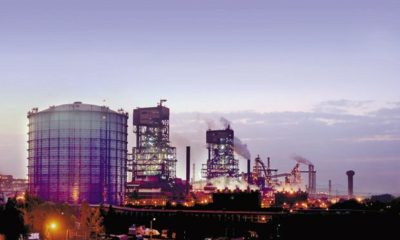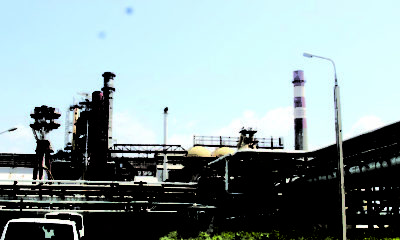The raging Russia-Ukraine crisis has been described as a threat to the resuscitation of the Ajaokuta Steel Company which is already at 98 percent completion.
Investors King gathered that the Ajaokuta Steel company located in Kogi State is the largest steel mill in Nigeria, its coke oven and byproducts plant are larger than all the refineries in Nigeria put together. However, it was abandoned after several years.
In view of this, President Muhammadu Buhari signed an agreement with the Russian government on revamping the steel company.
Dr Muda Yusuf, Chief Executive Officer, Centre for the Promotion of Private Enterprises (CPPE), in Lagos pointed out that Nigeria’s bilateral agreement with Russia may be stalled due to the sanctions against Russia.
Yusuf said the project was making great progress until the advent of the pandemic and while the world’s economy was recuperating, the Russia-Ukraine conflict set in.
He, however, added that global trade will be badly affected by the crisis as Russia owns major investments across the world and is a major player in the world’s economy.
Yusuf noted that prices of iron and steel will rise in the global market as the two contending countries are major exporters.
“There are financial transactions involving Russian investors. There are issues of trade especially in the area of iron and steel for which both Ukraine and Russia are reputed. The iron and steel market are also going to be affected by this, we are therefore likely to see a spike in prices of iron and steel products globally,” he said.
The Minister of Mines and Steel Development, Mr. Olamilekan Adegbite, had earlier stated that the Ajaokuta steel mill project’s business case had been accepted and agreed upon by the Russian government.
Adegbite said President Buhari of Nigeria and President Vladimir Putin of Russia met and made a bilateral agreement on government-to-government cooperation to revitalise the Ajaokuta steel mill because the Russians built Ajoakuta when they were the Soviet Union in collaboration with the Ukrainians.
“That is why we have gone back to them, the whole essence is for them to come here, access the plant and access the job to be done that is what we call a technical audit,” he said.
On the project funding, he said, “the Russian export centre, which is a Russian sort of Nexim bank, would provide $450million for the project and Afrexim bank will provide $1billion, which is a total of $1.45billion.”
The minister stated that after the audit of the project, the Russian technical experts will give the exact cost of the rehabilitation of Ajaokuta steel mill and the National Iron Ore Mining Company (NIOMCO)
He hinted that the two projects were linked together. The two are tied together and once this is done, there will be negotiations and at the end of the day, a sum will be agreed and the contract formed and that is the basis that we will proceed,” he said.
Other implications of the Russia-Ukraine conflict on Nigeria’s economy were listed as rising in energy prices (diesel, aviation fuel, kerosene and gas), which would affect petrol import and increase subsidy bills. Also, fiscal operations of government and federal accounts will be hit.

 Forex3 weeks ago
Forex3 weeks ago
 Naira2 weeks ago
Naira2 weeks ago
 Billionaire Watch2 weeks ago
Billionaire Watch2 weeks ago



 Naira3 weeks ago
Naira3 weeks ago






 Naira2 weeks ago
Naira2 weeks ago




 Naira1 week ago
Naira1 week ago




 Naira4 weeks ago
Naira4 weeks ago






 Naira1 week ago
Naira1 week ago


















